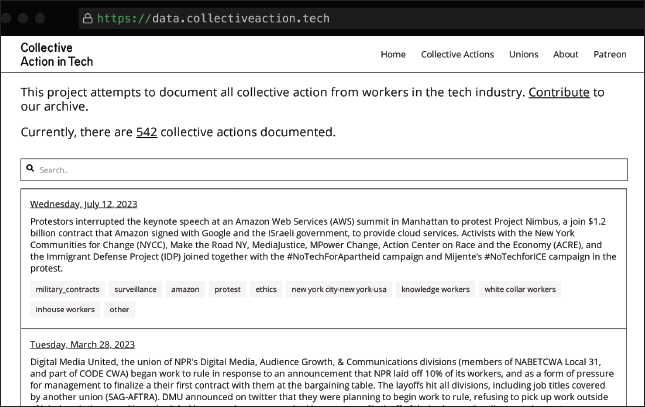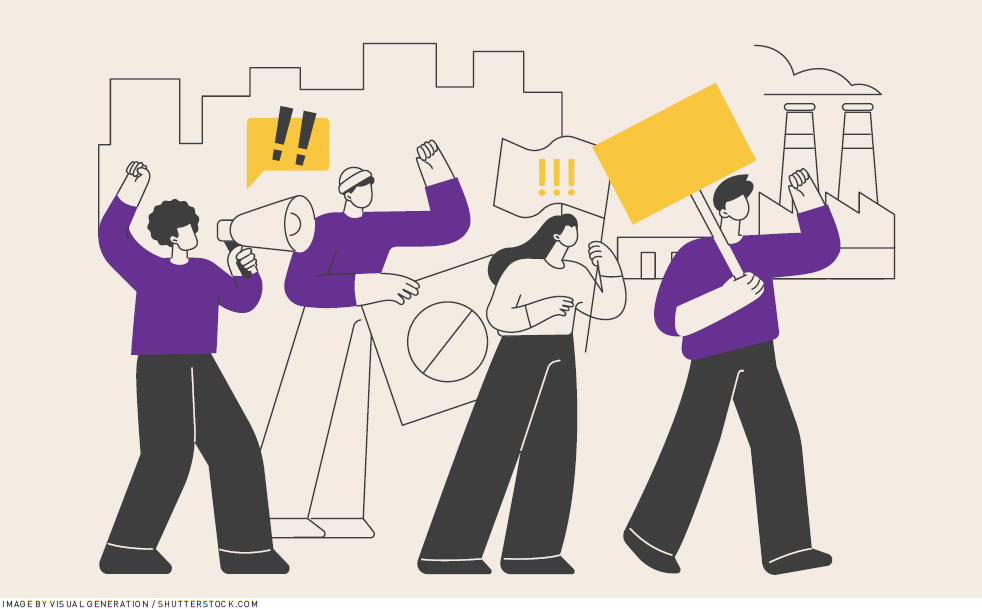Authors:
Nataliya Nedzhvetskaya, JS Tan
Since 2017, tech workers have participated in a new wave of collective action. Microsoft employees launched a barrage of petitions against the company's contracts with the Immigration and Customs Enforcement agency, the U.S. Department of Defense, and oil companies like Chevron. Googlers around the world walked out on the job following a mishandled sexual harassment case, demanding greater transparency and accountability. Amazon workers organized a protest at their employer's annual shareholder meeting, demanding that the company reduce its carbon footprint. Employees at smaller tech firms have also participated in various kinds of protests.
→ Since the 1960s, tech workers have been protesting in the workplace about both ethics issues and working conditions.
→ As AI becomes more prominent, we expect to see ethics and labor protests converge, as workers are called upon to support innovation and ensure responsible development and implementation.
According to the Collective Action in Tech archive (https://data.collectiveaction.tech/), there were more than 50 publicly reported actions by U.S. tech workers in 2022, a fivefold increase from the number in 2017. The year 2019 saw the greatest amount of activism—more than 90 publicly reported actions. Even as we see a slight decline in the total number of events over the past three years, we have seen a rise in more time-intensive, base-building organizing work such as union drives that suggests activism in the tech sector remains strong. The question remains: Why did tech workers begin to participate in employee activism so actively beginning in 2017? And what impact has this activism had?
More recently, new developments in AI technology may influence the development of labor organizing in tech. AI is shifting the kind of power that workers have such that we cannot assume professional workers will have the same labor market power they've had for the past few decades. How does the rise of AI force us to rethink the distinction between professional tech workers and platform workers?
In this article, we take on some of these questions. We begin with a brief overview of tech organizing in the U.S. We then introduce Collective Action in Tech, a research and community group started to advance the tech workers movement that offers a model for researchers to engage in social movement research. Finally, we argue that workers have a role to play in shaping tech futures.
 Overview of Tech Worker Organizing
Overview of Tech Worker Organizing
The tech industry in the U.S. has had a long history of employee activism, beginning in 1969 when Computer People for Peace petitioned the ACM to oppose the Vietnam War. Just a year later, Black IBM employees founded the National Black Workers Alliance of IBM, which not only spoke out against the company's involvement in South Africa but also demanded equal pay and better opportunities for Black employees. Throughout the 1980s, 1990s, and early 2000s, tech workers continued to participate sporadically in collective action to protest against a variety of issues that they deemed unethical or in contradiction with the moral values that tech workers embodied.
After the 2016 presidential election, however, collective action by tech workers rose to unprecedented levels. Nitasha Tiku [1] and Ben Tarnoff [2] have separately argued that the election of Donald Trump and the ensuing culture war was a key factor in understanding the rise of employee activism broadly by tech workers. Tech workers who joined the industry expecting to "make the world a better place" became disillusioned by the tarnished reputation of their employers, priming them for collective action. In apparent skepticism that their employers would resist Trump's bigotry, tech workers across the country pledged to not build a Muslim registry if asked to do so. In the subsequent years, tech workers also protested the industry's contracting with big oil, the U.S. Department of Defense, the Immigration and Customs Enforcement agency, and various police departments throughout the country. Notably, Google employees signed an open letter in 2018 demanding the cancellation of Google's contract with the military in the development of Project Maven—a project to develop machine capabilities in military drones—and saw their demands met.
Following the nationwide Black Lives Matter movement and the #MeToo movement several years before, gender-based and anti-Black discrimination were put at the forefront of American politics both in and out of the tech workplace. The Google sexual harassment walkout in 2018 remains one of the largest documented protests within the industry, attracting more than 20,000 participants from around the world. In perhaps the largest such demonstration, tens of thousands of employees across big tech companies reportedly participated in an eight-minute, 46-second work stoppage—the amount of time that a police officer knelt on George Floyd's neck—in protest of systemic racism.
Alongside protests of professional workers—the software engineers, UX designers, and product managers who have become associated with the term tech worker—there were longstanding protests by blue-collar workers, including service workers, gig workers, and contractors within the tech industry. In 2016, we saw the first protests by ride-share drivers in the U.S. around fare cuts and the first organized boycotts by drivers to oppose one-sided decisions by management. In the same year, Intel cafeteria workers successfully unionized with Unite Here Local 19. The incidence of protests by non-office tech workers, however, reached its peak in 2020, spurred by the Covid-19 pandemic. For many workers across the country, the pandemic, which subjected millions of primarily blue-collar workers to health and safety risks, led to new labor militancy across various industries. As the threat of Covid-19 subsided, firms began to enforce return-to-office policies after two years of remote work, a clear expression of management power.
Since our initial archiving, Collective Action in Tech has now documented more than 500 collective actions by tech workers.
In recent years, there has also been a shift in the character of tech organizing in the U.S., from political and social employee activism to a focus on labor issues concerning pay, working conditions, and a general demand for workers to have a say in the workplace. Unions are known as the most conducive vehicle for pressing on the latter. The Kickstarter United campaign, supported by the national Office and Professional Employees International Union (OPEIU), was the first notable and publicly documented instance of union organizing in this most recent wave of tech-worker organizing. Later, the Communication Workers of America (CWA) also started to target the tech sector, bringing organizing expertise and staff organizers from the gaming industry. Eventually, both groups launched programs with dedicated union staffers to organize the tech sector. Following their success with the Kickstarter union drive, OPEIU launched the Tech Workers Union Local 1010 to expand its portfolio of tech company unions. CWA launched the Campaign to Organize Digital Employees, which Alphabet employees affiliated with in 2020 under the name Alphabet Workers Union.
 | Screenshot of the Collective Action in Tech archive. |
When we started Collective Action in Tech in 2018, we mainly had the "techlash" in mind—specifically political and ethical protests by tech professionals, responding to the increasingly critical media coverage of big tech. For the purposes of this project, the tech industry includes any companies whose core business is information technology, the Internet, hardware, or software. Academics whose research concerns technology and students/interns who are preparing to enter the tech industry can also be considered tech workers. As we began archiving actions, however, our definition of a tech worker was challenged. If we are including Facebook software engineers, why not also Facebook content moderators? And if we are including Facebook content moderators, why not include other contracted labor like Uber drivers, Instacart shoppers, or platform workers in general?
Recalling Seyram Avle and Sarah Fox's expansive definition of tech worker [3] led us to make important connections between two movements that many people considered separate at the time. What did the labor actions of Uber drivers for fair wages have to do with the ethical protests of tech professionals opposing the development of a censored search engine in China? A lot, it turns out. Both are arguably part of the same fight against an unaccountable tech industry. Both have a stake in leveraging their expertise to improve the governance and minimize harms of rapidly changing technologies.
Since our initial archiving, Collective Action in Tech has now documented more than 500 collective actions by tech workers (see screenshot), which include both ethics-related protests and labor actions. This archive has been central to our understanding of the tech workers movement. We began the archive with the goal of providing data and insights on organizing, finding connections between different efforts, and building worker power in the tech industry.
Drawing on evidence from the archive, we found there are three types of claims that tech workers commonly make when they assert a role in governing the technologies they make possible [4]. First, workers can claim control over the product of their labor. They may identify with the product that they are producing and have an interest in ensuring that it is used toward an end they view as socially beneficial, or at least benign. Tech workers identified strongly with their role in designing and promoting the use of technologies and did not want to see these technologies used toward ends they did not agree with, whether repression of free speech by foreign governments, the continued decimation of the environment, or the surveillance of Muslim populations in the U.S.
The best hope we have is to empower the workers creating these technologies to speak up about potential harms before they occur.
Second, workers may have a privileged insight into the workings and consequences of the products they create by virtue of the time they spend constructing them; that is, they have proximate knowledge of the systems themselves. In 1986, a majority of professors in the top 20 university physics departments, along with more than 6,500 scientists, including many computer scientists, expressed their opposition to President Reagan's Strategic Defense Initiative, also known as the "Star Wars" program. Using their platform as experts to make their case, these scientists argued that the initiative's technical objective of preventing nuclear attacks, as advocated by the Reagan administration, was unrealistic. They also warned that pursuing such missile defense capabilities would likely intensify the arms race with the Soviet Union.
Lastly, workers may themselves be subjects of the harms they identify. This is especially likely to be the case for gig workers, who are subject to greater degrees of algorithmic management than most populations, for example, automated hiring and firing. However, workers may also identify with communities that are disproportionately affected by certain harms, for example, vulnerable immigrant populations or racial targets of incarceration who are more likely to be subject to surveillance technologies. It's no coincidence that anti-apartheid activism in IBM in the 1970s was led by Black IBM workers who had lived with the experience of racial discrimination themselves. These workers drew upon their lived experience to frame their activism and amplify awareness of a crisis in a foreign country for an American audience.
The Collective Action in Tech database has highlighted the diversity of struggles around the world, and also the role that we as researchers play when we choose definitions for the data we gather. As the tech worker movement has evolved, so has the archive. In its most recent iteration, we have been surprised by the rising incidence of labor activism among professional workers, a population usually confined to ethical or political protests and wary of traditional labor organizing. We believe this trend, however, has important implications for the future of tech worker organizing, particularly in the face of AI technologies.
 The Future of Tech Worker Organizing
The Future of Tech Worker Organizing
Worker organizing has a critical role to play in the governance of new technologies like AI. Government agencies or nonprofits have an important place in regulating new technologies and researching their potential harms, but these institutions alone lack the local and technical knowledge to effectively put up the appropriate guardrails. In many cases, they may not have the regulatory speed to keep up with the breakneck rate of innovation occurring in parts of industry.
The best hope that we have as a society to protect against the threats of unethical use of technology while preserving innovation is to empower the workers creating these technologies to speak up about potential harms before they occur. This includes not only leading scientists and developers but also those who manage, sell, and interface with these technologies, from the hired hands who tag the data for a few cents per task to the product managers who bring these products to market for six-figure salaries. It includes ride-share drivers and other kinds of gig workers whose wages are already being determined by algorithms.
Just as we found it necessary to escape the binary of professional versus precarious workers in order to build our archive, we now need to escape the binary of ethical protest versus labor organizing in order to fully imagine labor's role in shaping tech futures. As the recent strike by the Writers Guild of America evinces, protests over working conditions are also protests over the ethical use of technology and their social impact. They always have been—just ask the gig workers who have been protesting algorithmic wage-setting for over a decade now.
With the adoption of generative AI technologies, it's worth noting that we as a society have taken on a greater risk of the proletarianization of even "good jobs." In other words, jobs that were previously well compensated because of high demand for the skills and services they required may experience downward pressures or start to look like a real race to the bottom. If that happens, the distinction between professional workers and precarious workers may well cease to exist. And with it goes the distinction between ethics-related protests and labor organizing. Workers fighting for the right to bargain with their employer are not just fighting for a say in their working conditions, they are also fighting for their broader social impact.
Other industries offer an instructive model of a way forward. For instance, in the field of journalism, where a notable surge in union organizing has occurred since 2015, safeguarding editorial integrity has emerged as a prominent concern for journalists, particularly in light of new business initiatives like sponsored content that blurs the distinction between advertising and editorial work. As a result, journalists have turned to unionization as a means to uphold the integrity of their editorial output—a concern that has now been baked into several union contracts throughout the industry.
Teachers' unions similarly play a key role in shaping education reform and have served as catalysts for creating transformative change in public schools in the U.S. In states and school districts with strong union representation, student outcomes also tend to be better [5]. And nurses with unions provide better healthcare because they can advocate for a more even nurse-to-patient ratio, which improves nurses' working conditions and simultaneously ensures greater quality of patient care [6].
This is not to say that every viewpoint held by workers will always be in the best interests of society. It would be naive, however, to ignore the privileged insights that the individuals at the forefront of designing these technologies have and their societal implications. To fully harness the expertise and commitment of workers in shaping tech futures, policymakers and legal scholars need to reassess and update labor laws, allowing workers to actively participate in shaping the responsible development and deployment of technologies. Most important, however, workers themselves need to recognize the power of organizing the workplace as a means of making their voice heard.
1. Tiku, N. Three years of misery inside Google, the happiest company in tech. Wired. Aug. 13, 2019; https://www.wired.com/story/inside-google-three-years-misery-happiest-company-tech/
2. Tarnoff, B. The making of the tech worker movement. Logic(s). May 4, 2020; https://logicmag.io/the-making-of-the-tech-worker-movement/full-text/
3. Seyram, A and Fox, S.. Tech labor: a new interactions forum. Interactions 28, 4 (2021), 24–26; https://doi.org/10.1145/3466994
4. Nedzhvetskaya, N. and Tan, JS. The role of workers in AI ethics and governance. The Oxford Handbook on AI Governance. Oxford Univ. Press, 2022.
5. Weiner, L. The Future of Our Schools: Teachers Unions and Social Justice. Haymarket Books, 2012.
6. Dube, A., Kaplan, E., and Thompson, O. Nurse unions and patient outcomes. ILR Review 69, 4 (2016), 803–833; https://doi.org/10.1177/0019793916644251
Nataliya Nedzhvetskaya is a Ph.D. candidate in sociology at the University of California, Berkeley and a Dissertation Scholar at the Washington Center for Equitable Growth studying workplace activism, technology, and labor. She has been a member and archivist for the nonprofit workers' rights group Collective Action in Tech (https://collectiveaction.tech/) since 2018. [email protected]
JS Tan is a Ph.D. student in the international development group at the Massachusetts Institute of Technology. His research interests include the political economy of innovation, industrial policy, and platform economies. He is a member of Collective Action in Tech and previously worked as a software engineer. [email protected]
 This work is licensed under a Creative Commons Attribution International 4.0 license.
This work is licensed under a Creative Commons Attribution International 4.0 license.
The Digital Library is published by the Association for Computing Machinery. Copyright © 2024 ACM, Inc.








Post Comment
No Comments Found